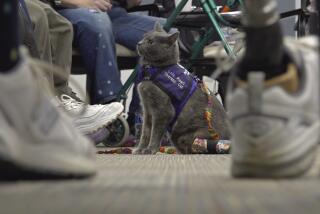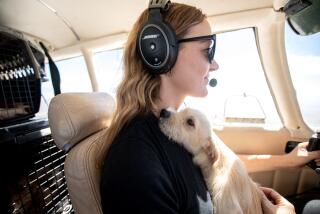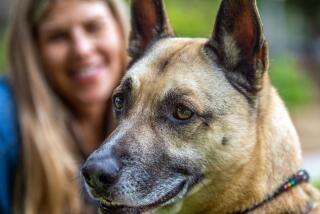Pets as ‘Co-Therapists’ Idea Gaining Respect
- Share via
SAN FRANCISCO — Heart attack victims, high blood pressure sufferers and even hardened criminals can all benefit from the same remedy--pets, a panel of scientists reports.
Although use of pets as helpers for the handicapped goes back 1,100 years, “the scientific study of the human-animal bond and its effects is a very new field,” Oakland veterinarian James Harris told the 65th annual meeting of the Pacific Division of the American Assn. for the Advancement of Science at San Francisco State University.
“When the first paper on ‘dog as co-therapist’ was presented in 1966, the researcher was laughed at in unison,” said psychologist Aline Kidd of Mills College in Oakland. “Recently, scientists have been looking at the role of pets and coming up with some interesting observations.”
‘Significant Impact’
A 1980 study of heart attack victims found pets had “significant impact” on the survival rates one year later, said animal researcher Peter Messeni of Vernon, Calif.
Two other studies of people suffering from high blood pressure reported “significant reduction in blood pressure in the presence of a pet,” he said.
“One theory says pets provide Westerners--who shun touching each other, except during sex--with acceptable touchable objects. Touching has been shown to have positive therapeutic values. Other theories say since pets can sense danger, petting a contented dog who is at ease puts the owner at ease.”
Prisoners Turn Soft
A program at Purdy Treatment Center for Women in Gig, Wash., has turned “some of the toughest women prisoners into real softies after they were given dogs to train for the disabled,” said Leo Bustad, dean emeritus and professor at the College of Veterinary Medicine, Washington State University.
One inmate came into the maximum security prison as “incorrigible, arrogant, refusing to get along,” Bustad said in an interview. “After training dogs for the blind and disabled, she is changed completely. Pets can be real humanizers as well as companions and helpers.”
More to Read
Sign up for Essential California
The most important California stories and recommendations in your inbox every morning.
You may occasionally receive promotional content from the Los Angeles Times.













